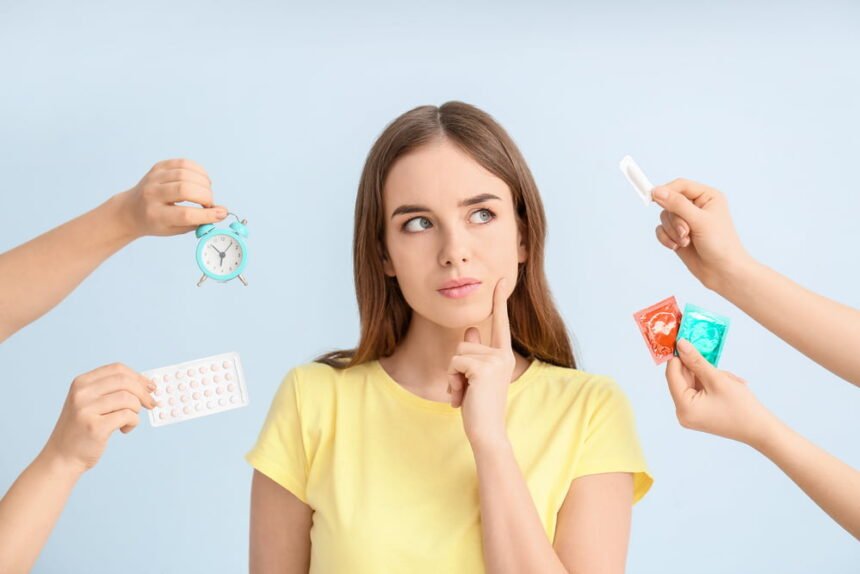Birth control has been a popular topic in many political circles. Melinda Gates even had a discussion about improving access to birth control pills.
Birth control does a great job of preventing unplanned pregnancy. Unplanned pregnancy is considered an epidemic, since there are three million every year and half of them (1.5 million) result in abortion. However, for various reasons, you may need to get off these pills. It’s probably time to get a new baby, or you are looking to switch birth control methods or have side effects from the one you are on. Quitting birth control can affect people differently.
While some can get pregnant immediately after they stop birth control, others may need their body to adjust to the new normal. It may take a few months for them to begin ovulation. For some others, they may experience a delay before the period normalizes. That being said, it is not out of the ordinary to experience late or irregular periods after quitting hormonal birth control. Two things to expect if you are quitting birth control.
1. Lack of hormones
The body now has the job of producing hormones to regulate periods. Before now, the hormonal birth control you were on was in charge of regulating your body’s hormones and period. Even though the pill blocks ovulation, you experience withdrawal bleeding when you go on break from your pills. Now that your body is in charge, your body may lack the hormone required to bring your period back. This may go on for a while until it normalizes after some time.
Hormonal changes after quitting birth control can also increase your sex drive. One study found that 15% of women feel much stronger sexual urges after quitting birth control.
2. Delayed ovulation
Without contraceptives, ovulation ought to happen once every menstrual cycle. But if you were on any of the hormonal birth control methods, like the pill, injections, or implants, they were able to work by preventing the chances of ovulation. So it may take time for your body to regularise the return of ovulation. Until there is ovulation, period may not occur because eggs need to be released to the ovaries. Period will take place when there are unfertilized eggs and a shift in hormone levels. You will need to find out what the issues are with your doctor, as they might lead to concerns like the need for emergency contraception.
Pregnancy after quitting
Pregnancy may be an unexpected occurrence after stopping birth control. Sometimes ovulation may happen undetected after you stop birth control. There might be a remote possibility that you could be pregnant. A pregnancy test would confirm this. Pregnancy is possible if you have been sexually active after stopping birth control and haven’t resumed seeing your menses after 4weeks.
If menses doesn’t return
In many cases, a woman’s body will go back to normal hormone production, and menstruation reverts to how it used to be after stopping birth control. This means that if you had irregular periods before you started birth control, it may not change from that when you stop birth control. So, your menstrual history should be considered before concluding that there might be a problem or not if you have yet to resume your period.
However, It might become necessary to check for any underlying medical issues that birth control may have masked. Truth is, if you are not seeing your period, it’s not because of being on birth control and has nothing to do with birth control. Some factors to consider if your period hasn’t returned yet include:
- Chronic stress: cortisol produced when your body undergoes stress can lead to delayed light or no period.
- PCOS: polycystic ovary syndrome stops your period. At other times it makes your period hard to predict because it has become irregular. It is a hormonal condition that affects women. It occurs when hormones are out of balance.
- Thyroid disorder: When the body produces too much or too little thyroid hormone, periods may stop for a short or long time.
- Chronic vitamin D deficiency: your doctor can assess vitamin D status and supplement to address insufficiency and help regulate menstrual disorders.
- Weight loss: Intense exercise and significant weight loss can alter reproductive hormone levels that prevent ovulation and menstruation from taking place.
- Ovarian cysts occur when the ovaries make more male hormones than necessary and can cause cysts to develop on the ovaries. They may disappear but can cause complications like menstrual irregularities if they do not.
- Premature menopause is when one stops seeing their period before they turn 40. At this point, a woman stops ovulating, and the monthly period ceases.
Your doctor may recommend treatment for secondary amenorrhea if there are any underlying issues. Taking supplements or working on higher daily caloric intake. Sometimes progesterone injection may be administered to make your period come back. Lifestyle changes and exercises can help with weight loss-related cases.
When to see a doctor
Let your doctor know after going 3 months without a period. You should ASAP if you experience severe and persistent symptoms like:
- Fevers
- Vision changes
- Bad headaches
- Hair Loss
- Excess hair growth
- Breast secretion or milk production
Side effects of quitting birth control
It is normal to experience certain side effects after stopping birth control. Side effects are temporary and usually go away on their own without needing treatments. Some are beneficial for those who experienced side effects from using Birth control. Once they quit, side effects reverse. Increased libido, fewer headaches, improved mood, and less nausea are some of the benefits you may enjoy if you suffered otherwise while on birth control.
For some others, they may experience the following side effects
- spotting or bleeding between periods
- breast tenderness
- changes to the skin or hair
- headaches
If you used contraceptives to manage certain premenstrual or health conditions, expect that when you stop birth control, these conditions will likely come back. These conditions include:
- premenstrual syndrome (PMS)
- premenstrual dysphoric disorder (PMDD)
- polycystic ovary syndrome (PCOS)
- Period pain
- Mood swings
- Acne
- Menstrual migraines.
Some things you can do to help regulate your cycle
Manage stress
Hormonal imbalance is the culprit responsible for missing or irregular periods. Sufficient rest and sleep can help drop cortisol and blood sugar levels. It also helps in balancing hormone levels.
Consume cruciferous vegetables
Lettuce, broccoli, and other dark green veggies contain DIM, which helps to balance hormones. For instance, they help to metabolize excess estrogen. According to research by Zoey, DIM present in these vegetables facilitates a healthy menstrual cycle and reduces certain kinds of cancers that are estrogen sensitive.
Eat healthily
Consume food with complex carbs. These include oatmeal, whole-wheat bread, cereal, beans, barley, potatoes, sweet potatoes, and other plant-based foods. These foods are rich in vitamins, phytochemicals, and minerals. Around 3-quarters of daily calories should come from complex carbohydrates. Fruits and healthy fats in nuts and avocados are also essential for optimal health. Fatty acids are equally important for hormonal health and improve the menstrual cycle
Reduce sugar consumption
Sugar intake can worsen insulin resistance. Irregular menstruation can be a sign of increased insulin levels. As much as you can, avoid sugar. The easiest way to pull this off is to avoid consuming processed food.
Inositol
This nutrient can help to facilitate ovulation in women. It normalizes ovarian function, improves oocyte and embryo quality in PCOS, and re-establishes ovulatory menstrual cycles.
Conclusion
After getting off the birth control pill, it may take up to 3 months or more for your period to return. This isn’t yet an indicator that there is an underlying issue. Until you have been examined and tested by a doctor, only then can it be established that something may be wrong somewhere. If everything seems okay after visiting a doctor, you can work on restoring your menstrual cycle by eating a hormone-healthy diet. It’s always wise to speak to your doctor if you don’t get your period after 3 months of stopping your pills.









